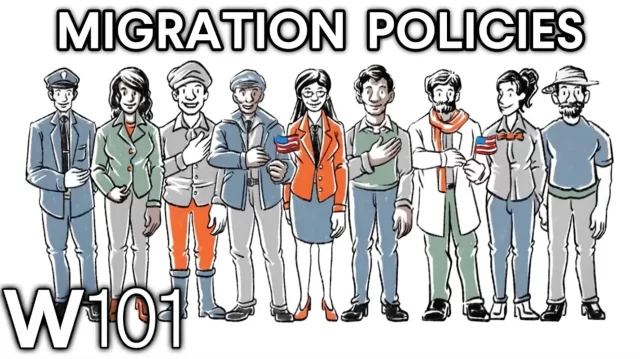Immigration policies, both restrictive and liberal, have played a crucial role in shaping national identity across various nations. These policies, enacted by governments, have influenced the demographic composition, cultural landscape, and societal values, thereby molding the collective identity of a nation. In this log, the ways in which immigration policies have been used to shape national identity will be explored, highlighting the passive mechanisms through which these outcomes have been achieved.
Historical Context
Throughout history, immigration policies have been implemented to control the influx of foreign nationals, with the intent of preserving or altering the national identity. During the late 19th and early 20th centuries, restrictive immigration laws were introduced in many countries, including the United States and Australia, to maintain a homogeneous national identity. The Chinese Exclusion Act of 1882 and the Immigration Act of 1924 in the United States, along with the White Australia Policy, are examples of such policies that were enacted to limit the entry of certain ethnic groups, thereby preserving the perceived racial and cultural purity of the nation.
Demographic Impact
The demographic composition of a nation has been directly influenced by immigration policies. By selecting which groups were allowed to enter, governments have shaped the ethnic and cultural makeup of their populations. Policies favoring immigrants from certain regions or countries have been used to encourage the influx of particular ethnic groups, thus influencing the national identity. For instance, in the post-World War II era, policies favoring European immigrants were adopted by countries like Canada and Australia, resulting in a predominantly European-descended population and a national identity closely tied to European cultural heritage.
Cultural Influence
Immigration policies have also affected the cultural landscape of nations. The assimilation or integration of immigrants into the host society has been influenced by these policies, which, in turn, have impacted the national identity. In countries where multiculturalism has been promoted through liberal immigration policies, a more diverse and inclusive national identity has emerged. Canada’s policy of multiculturalism, introduced in the 1970s, is a prime example of how liberal immigration policies have fostered a multicultural national identity, celebrating diversity and inclusion.
Economic Factors
The economic impact of immigration policies has further influenced national identity. By allowing skilled labor and professionals to immigrate, countries have enhanced their economic development, which has contributed to a sense of national pride and identity. Nations that have successfully integrated skilled immigrants into their economies, such as the United States with its H-1B visa program, have seen their national identity evolve to include an appreciation for innovation and economic prosperity driven by diverse talent.
Social Cohesion and Integration
The integration of immigrants into the host society has been a key factor in shaping national identity. Policies that promote social cohesion and integration, such as language and civic education programs, have been implemented to facilitate the incorporation of immigrants into the national fabric. In countries like Germany, the integration policies introduced in the early 2000s aimed at improving language skills and civic participation among immigrants, thereby fostering a sense of belonging and contributing to the national identity.
National Security Concerns
National security concerns have also influenced immigration policies and, consequently, national identity. In the aftermath of terrorist attacks and global conflicts, restrictive immigration policies have been adopted to ensure national security. These policies, while aimed at protecting the nation, have sometimes led to a more insular and exclusionary national identity. The post-9/11 immigration policies in the United States, which increased scrutiny and restrictions on immigrants from certain regions, have been perceived as contributing to a national identity characterized by heightened security concerns and suspicion of outsiders.
Political and Ideological Factors
Political and ideological considerations have played a significant role in shaping immigration policies and national identity. Governments with different political ideologies have implemented policies reflecting their views on immigration and national identity. Conservative governments have tended to adopt more restrictive immigration policies, emphasizing the preservation of traditional national values and identity. In contrast, progressive governments have often promoted liberal immigration policies, advocating for diversity and inclusion as key components of national identity.
Globalization and Transnationalism
The forces of globalization and transnationalism have further influenced immigration policies and national identity. In an increasingly interconnected world, the movement of people across borders has challenged traditional notions of national identity. Immigration policies have had to adapt to these changes, leading to a more fluid and dynamic understanding of national identity. The European Union’s policy of free movement within member states is an example of how transnationalism has reshaped national identities, promoting a sense of European identity alongside national identities.
Conclusion
In conclusion, immigration policies have played a pivotal role in shaping national identity through various passive mechanisms. The demographic composition, cultural landscape, economic development, social cohesion, national security, political ideologies, and the forces of globalization and transnationalism have all been influenced by these policies, leading to the evolution of national identity over time. By understanding the impact of immigration policies on national identity, a deeper insight into the complex interplay between governance, migration, and national identity can be gained, highlighting the importance of thoughtful and inclusive immigration policies in shaping a nation’s future.










